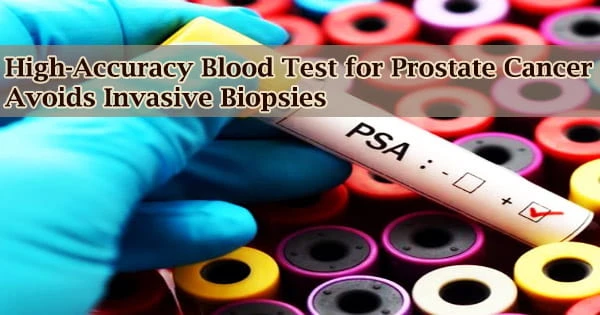According to research from Queen Mary University of London, a brand-new, straightforward blood test can now successfully and accurately identify the existence of aggressive prostate cancer. The new test, when used in conjunction with the PSA test currently available, may help men avoid overdiagnosis, overtreatment, and pointless and intrusive biopsies.
In Western men, prostate cancer is the most prevalent type of cancer, with 1.3 million new cases being discovered worldwide each year. Currently, a blood test that analyzes PSA levels is used to find it.
Although the PSA blood test can detect cancer early, it has a low sensitivity (many false positives), and over 75% of all positive PSA readings result in negative biopsies that do not detect malignancy.
When a high PSA level in the blood is found, a tissue biopsy of the prostate gland is performed on the patient. This procedure is invasive and comes with a high risk of bleeding and infection. Most patients with increased PSA levels who undergo biopsy are determined to be cancer-free.
In addition, the majority of early-stage prostate cancer diagnoses do not progress to death if untreated. Because of this, many men are overdiagnosed with prostate cancer and treated excessively as a result of the present practice of combining a PSA test and biopsy for the disease.
The Parsortix® technology from ANGLE plc, a new prostate cancer test, finds circulating tumor cells (CTCs), or early cancer cells that have left the original tumor and entered the circulation before spreading throughout the body.
The current prostate cancer test often leads to unnecessary invasive biopsies and over-diagnosis and overtreatment of many men, causing significant harm to patients and a waste of valuable healthcare resources. There is clearly a need for better selection of patients to undergo the biopsy procedure.
Professor Yong-Jie Lu
It may offer a more reliable test for prostate cancer by measuring intact living cancer cells in the patient’s blood as opposed to PSA protein, which may be present in the blood for reasons other than disease.
The utility of the CTC test in 98 pre-biopsy patients and 155 patients with newly diagnosed prostate cancer who were enrolled at St. Bartholomew’s Hospital in London was examined in the study, which was published in the Journal of Urology.
The research team discovered that CTCs in blood samples taken prior to a biopsy were a reliable indicator of the existence of aggressive prostate cancer and effectively and non-invasively predicted the outcome of the biopsy.
More accurately than any other previously reported biomarker, the CTC tests were able to predict the existence of aggressive prostate cancer in subsequent biopsies when combined with the existing PSA test.
Additionally, the quantity and type of CTCs found in the blood were a sign of the cancer’s aggressiveness. Concentrating on prostate cancer that is more aggressive may lessen overtreatment and pointless biopsies for benign and non-aggressive diseases.
Lead researcher Professor Yong-Jie Lu from Queen Mary University of London said:
“The current prostate cancer test often leads to unnecessary invasive biopsies and over-diagnosis and overtreatment of many men, causing significant harm to patients and a waste of valuable healthcare resources. There is clearly a need for better selection of patients to undergo the biopsy procedure.”
“Testing for circulating tumour cells is efficient, non-invasive and potentially accurate, and we’ve now demonstrated its potential to improve the current standard of care. By combining the new CTC analysis with the current PSA test, we were able to detect prostate cancer with the highest level of accuracy ever seen in any biomarker test, which could spare many patients unnecessary biopsies. This could lead to a paradigm shift in the way we diagnose prostate cancer.”
Since this was a one-center study, more independent research centers will need to confirm the findings before the CTC test is made publicly or privately available in the UK, which might take an additional three to five years. It can possibly require three to five years for US Food and Drug Administration clearance.
Cancer Research UK, Orchid Cancer Appeal, and ANGLE plc (which manufactures the Parsortix system) provided funding for this project. The study’s design, the gathering, analysis, and interpretation of the data, as well as the authoring of the research paper, were unaffected by the funding sources.
















